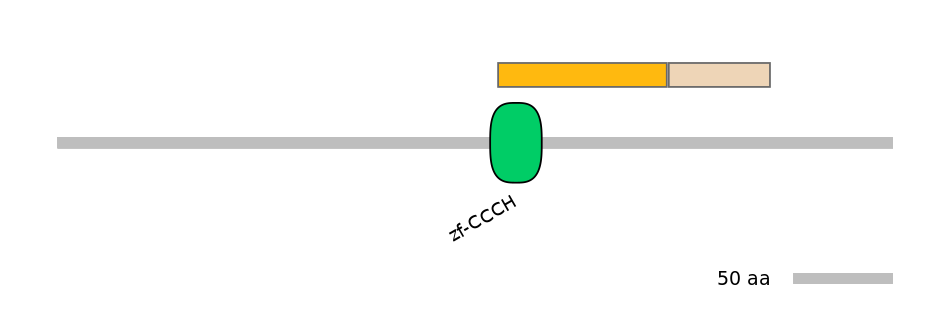MmuEX0028097 @ mm9
Exon Skipping
Gene
ENSMUSG00000027763 | Mbnl1
Description
muscleblind-like 1 (Drosophila) [Source:MGI Symbol;Acc:MGI:1928482]
Coordinates
chr3:60417185-60419695:+
Coord C1 exon
chr3:60417185-60417442
Coord A exon
chr3:60418605-60418658
Coord C2 exon
chr3:60419542-60419695
Length
54 bp
Sequences
Splice sites
3' ss Seq
CTCGCTGCCTGCTAATTAAGACT
3' ss Score
1.06
5' ss Seq
CTGGTACTA
5' ss Score
3.1
Exon sequences
Seq C1 exon
GTGTGTCGAGAGTACCAGCGTGGCAATTGCAACAGAGGAGAAAATGACTGTCGGTTTGCTCATCCTGCTGACAGCACAATGATTGATACCAATGACAACACAGTCACTGTCTGCATGGATTACATCAAGGGGAGATGCTCTCGGGAAAAGTGCAAATACTTCCATCCTCCCGCACACCTGCAAGCCAAGATCAAGGCTGCCCAATACCAGGTCAACCAGGCTGCAGCAGCACAGGCTGCAGCTACTGCAGCTGCCATG
Seq A exon
ACTCAGTCGGCTGTCAAATCACTGAAGCGACCCCTCGAGGCAACCTTTGACCTG
Seq C2 exon
GGAATTCCTCAAGCTGTACTTCCCCCATTGCCAAAGAGGCCTGCTCTTGAAAAAACCAACGGTGCCACCGCAGTCTTTAACACTGGTATTTTCCAATACCAACAGGCTCTAGCCAACATGCAGTTACAGCAGCATACAGCATTTCTCCCACCAG
VastDB Features
Vast-tools module Information
Secondary ID
ENSMUSG00000027763_MULTIEX2-1/4=C1-2
Average complexity
S
Mappability confidence:
100%=100=100%
Protein Impact
Alternative protein isoforms (No Ref)
Show structural model
Features
Disorder rate (Iupred):
C1=0.115 A=0.000 C2=0.143
Domain overlap (PFAM):
C1:
PF0064219=zf-CCCH=PD(81.5=25.6)
A:
NO
C2:
NO


Other Inclusion Isoforms:
NA
Other Skipping Isoforms:
Associated events
Other assemblies
Conservation
Primers PCR
Suggestions for RT-PCR validation
F:
CCAATACCAGGTCAACCAGGC
R:
AGTGTTAAAGACTGCGGTGGC
Band lengths:
142-196
Functional annotations
There are 5 annotated functions for this event
PMID: 31730826
In this study, the authors first identified the discriminative expression and splicing profiles of the muscleblind-like 1 (MBNL1) gene in postnatal brown adipose tissues (BATs) compared to those of embryonic BATs. A shift in the MBNL1+ex 5 isoform 7 (MBNL1-7) to MBNL1-ex 5 isoform 1 (MBNL1-1) was characterized throughout BAT development or during the in vitro browning of pre-WAs, 3T3-L1 cells. The interplay between MBNL1 and the exonic CCUG motif constitutes an autoregulatory mechanism for excluding MBNL1 exon 5. The simultaneous association of RNA-binding motif protein 4a (RBM4a) with exonic and intronic CU elements collaboratively mediates the skipping of MBNL1 exon 5. Overexpressing the MBNL1-1 isoform exhibited a more-prominent effect than that of the MBNL1-7 isoform on programming its own transcripts and beige cell-related splicing events in a CCUG motif-mediated manner. In addition to splicing regulation, overexpression of the MBNL1-1 and MBNL1-7 isoforms differentially enhanced beige adipogenic signatures of 3T3-L1 cells.
PMID: 21454535
The exon 5 and 6 regions are both needed to control the nuclear localization of MBNL1
PMID: 27733504
The presence of alternative ex.54nt always significantly elevated MBNL1 and MBNL2 protein levels (_2.7 and _4.0-times, respectively). There were marginal changes of the GFP-MBNL level for constructs carrying ex.36nt (_1.3-times) and ex.95nt (_0.8-times). There were no significant differences between the activities of the analyzed proteins for the majority (67%) of AS events. However, these exons might have either a positive or negative effect on some specific AS events (Figure 5A and C). Interestingly, exOFF events predominated in AS events with a negative effect of ex.36nt (95%; P = 0.002) and a positive effect of ex.95nt (90%; P = 0.010). All together, these data indicate that the presence of sequences encoded by these alternative exons can significantly modulate MBNL splicing activity, but this regulation depends strongly on the targeted RNA.
PMID: 29955876
Inclusion/exclusion of the exon affects splicing activity with sequential and overlapping binding motifs, as shown by competition assays between isoforms.
PMID: 31911676
Nuclear localization. Induction of MBNL1 exon skipping drove expected functional consequences. Nuclear levels of total MBNL1 were quantitatively lower following delivery of each pgRNA that induced appreciable exon skipping.
GENOMIC CONTEXT[edit]
INCLUSION PATTERN[edit]
SPECIAL DATASETS
- Pre-implantation embryo development
- Neural differentiation time course
- Muscular differentiation time course
- Spermatogenesis cell types
- Reprogramming of fibroblasts to iPSCs
- Hematopoietic precursors and cell types